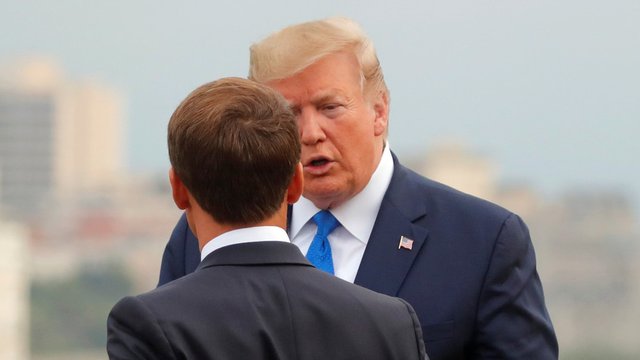As leaders of the world’s seven most developed countries descended on Biarritz for their annual summit, there was more disagreement than harmony among the group, and more petty squabbling than in a soap opera.
Trade tension, environmental anxiety, tech taxes and Brexit woes have cast a shadow over the meeting in France so that European Council President Donald Tusk predicted a “difficult test of unity and solidarity.”
French President Emmanuel Macron and US President Donald Trump jabbed at each other even before the American touched down on French soil. Macron urged world leaders to follow France’s example and impose a digital tax on Silicon Valley tech companies, which he said on Wednesday “are not contributing to the common good.” Trump took offense, and threatened on Friday to tax “their wine like they’ve never seen before” in response.
Donald Trump and Emmanuel Macron speak in Biarritz © Reuters / Carlos Barria
Nevertheless, both leaders appeared all smiles after a lunch on Saturday. Trump brushed off their earlier spat, saying “every once in a while we go at it a little bit.” Still, the joviality is unlikely to soften Trump up to accepting Macron’s plan to save the Iran nuclear deal that would involve negotiating with the Islamic Republic and allowing it to sell its oil.
Trump and Macron’s beef was not the only fictitious trade issue on display, with the US president arriving in France shortly after announcing an additional five percent tariff on $550 billion worth of Chinese imports and “ordering” American companies to leave China. The other G7 leaders have long opposed Trump’s mercantilism, and the addition of new UK Prime Minister Boris Johnson did not change the balance.
Johnson promised to lecture Trump on his trade dispute with Beijing, which he said could potentially cause a “downturn in the global economy.” Nevertheless, Johnson will have to tread carefully, as the UK will soon be seeking a trade deal of its own with the US, should Brexit proceed as planned on October 31.
Johnson also slammed Macron for his own trade tiff with Brazil. Accusing Brazilian President Jair Bolsonaro of lying about his efforts to tackle climate change, Macron promised to place the burning Amazon rainforest at the top of his agenda for the weekend, and threatened to veto a trade deal between the EU and the Mercosur bloc that includes several South American countries.
With the deal 20 years in the making, Johnson told reporters on Saturday that “There are all sorts of people who will take any excuse at all to interfere with trade and to frustrate trade deals and I don’t want to see that.” The previous evening, German Chancellor Angela Merkel said that blocking the deal - which would also affect Argentina, Uruguay and Paraguay - was “not the appropriate answer.”
On Brexit, Johnson was the subject of snide remarks from Donald Tusk, who said he hoped “Prime Minister Johnson will not like to go down in history as ‘Mr. no-deal,’” should the UK exit the union without any sort of trade agreement, as the British leader has said he would be willing to do. In a kind of ‘I know you are but what am I?’ response Johnson quipped that “if Donald Tusk does not want to go down as ‘Mr No Deal’ Brexit then that point should be borne in mind too.”
Last year’s summit in Canada ended in disarray, as President Trump withdrew his signature from the joint communique traditionally issued by the leaders at the end of the weekend. Macron’s decision to forego the communique this year speaks to the discord within the group. Which of course begs the question: if the world’s seven most advanced democracies cannot agree on such a bland and perfunctory statement, then why go through the process at all?
